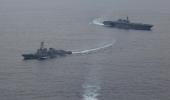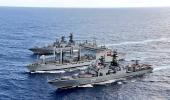Chairing a high-level United Nations Security Council open debate, Prime Minister Narendra Modi on Monday put forward five principles, including removing barriers for maritime trade and peaceful settlement of disputes, on the basis of which a global roadmap for maritime security cooperation can be prepared.

In his statement while chairing the debate on "Enhancing Maritime Security - A Case for International Cooperation" via video conferencing, Modi highlighted that maritime routes were being misused for terrorism and piracy.
He stressed that the oceans are the world's common heritage and sea routes the lifeline of international trade.
Underlining that the countries' shared maritime heritage is facing many challenges, the prime minister put forward five principles on the basis of which, he said, a global roadmap for maritime security cooperation can be prepared.
"We should remove barriers for legitimate maritime trade. Global prosperity depends on the active flow of maritime trade. Any hindrance in maritime trade can threaten the global economy," Modi said elaborating the first principle.
The second principle, he said, was that the settlement of maritime disputes should be peaceful and on the basis of international law.
"This is very important for mutual trust and confidence. This is the only way we can ensure global peace and stability," he said.
Modi said the third key principle was that the global community should together face natural disasters and maritime threats created by non-State actors.
India has taken several steps to enhance regional cooperation on this subject, he added.
Preserving the maritime environment and maritime resources, and encouraging responsible maritime connectivity were the fourth and fifth principles enunciated by the prime minister.
Modi is the first Indian prime minister to preside over a UN Security Council Open Debate, according to the Prime Minister's Office.
The meeting was being attended by several heads of state and government of member states of the United Nations Security Council, and high-level briefers from the UN system and key regional organisations.
The open debate was focussed on ways to effectively counter maritime crime and insecurity, and strengthen coordination in the maritime domain.
The UN Security Council has discussed and passed resolutions on different aspects of maritime security and maritime crime in the past.
However, this is the first time that maritime security was discussed in a holistic manner as an exclusive agenda item in such a high-level open debate.











 © 2025
© 2025